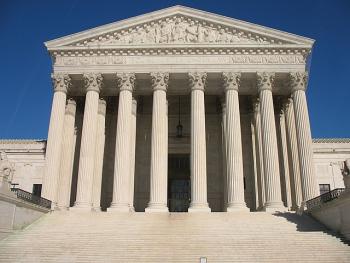
When Joseph Kennedy began kneeling on the football field after games to pray, he probably had no idea the decision would land him in the Supreme Court. The former Bremerton, Washington high school assistant football coach had started the practice in 2008. Initially, he went by himself, but eventually, other students, including some on the team began to join him for postgame prayer at the 50-yard-line. By 2015, however, the Bremerton School District began a heated debate over whether the prayers violated the Establishment clause, which prohibits promoting specific religious practices in state-sponsored entities like schools. After some discussion, Kennedy did stop leading pregame prayers, as well as postgame prayers with students. However, he continued the practice of going by himself to pray on the field after games.
The school district requested Kennedy stop the practice and put him on paid leave after a game on October 26, when he did not stop praying on his own in the field. Despite receiving positive evaluations in previous years, the school district gave Kennedy a negative evaluation after the 2015 season, stating that Kennedy should not be rehired for not following district policy in regard to religious expression. Kennedy opted not to reapply for his position the following school year and sued the school district August 2016. When that lawsuit was brought to the 9th U.S. Circuit Court of Appeals, they sided with the school district. Kennedy’s legal team petitioned the Supreme Court, which initially bumped the case to another lower court before finally agreeing to take it in February of this year.
In a 6-3 ruling on Monday, the Supreme Court found that the school district had violated Kennedy’s First Amendment rights. In a dissent written by Justice Sonia Sotomayor, who was joined by Justices Breyer and Kagan, stated that “some students reported joining Kennedy’s prayer because they felt social pressure to follow their coach and teammates.” Justice Neil Gorsuch, however, writing for the majority, stated that Kennedy, “prayed during a period when school employees were free to speak with a friend, call for a reservation at a restaurant, check email, or attend to other personal matters.” He closed the opinion by stating, “Respect for religious expressions is indispensable to life in a free and diverse Republic—whether those expressions take place in a sanctuary or on a field, and whether they manifest through the spoken word or a bowed head.”
Kennedy, who has since moved to Florida after leaving his job in Bremerton, was elated by the decision and said in a statement, “This is just so awesome. All I’ve ever wanted was to be back on the field with my guys … I thank God for answering our prayers and sustaining my family through this long battle.”


